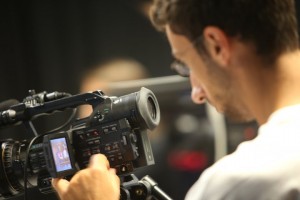 It’s 9:30 a.m. on a Thursday, and students in Professor Mark Crain’s Economics of Elections course are scurrying around the set of The Vibe to tape this week’s news show.
It’s 9:30 a.m. on a Thursday, and students in Professor Mark Crain’s Economics of Elections course are scurrying around the set of The Vibe to tape this week’s news show.
Check out the best of The Vibe.
Kurumi Fukushima ’12 (Glen Ridge, N.J.) is making last-minute changes to the script on the teleprompter, Melissa Appelstein ’12 (Needham, Mass.) fiddles with the lights so they don’t cast shadows, and studio manager Jen Brady ’11 (Freehold, N.J.) calls for a sound check on anchor Jake Greenberg’s microphone.
“I’ll be talking like this,” Greenberg ’11 (Somers Point, N.J.) says in a deep voice from the paneled anchor desk.
Producer Steve Macurdy ’11 (Lumberton, N.J.), a lanky economics and business major with curly brown hair and wire-rimmed glasses, is summoned to the production booth where he gets some bad news.
Camera 2 isn’t transmitting live images to the computer.
“The cable’s broken,” explains Andy Pianko ’11 (Indianapolis, Ind.), sitting in front of the screen in the small room.
“Then we’ll just have to tape and edit in Final Cut Pro,” says a frustrated Macurdy as he heads back out to the studio anticipating a long night of post production. “It’s always something.”
Such is life at The Vibe, a weekly news program produced entirely by Crain’s students, many who’ve never had broadcast experience or taken a journalism class. The show, which airs on the Web, tackles political and campus issues, upcoming events, silly parodies, and interviews with accomplished alumni. Students even interviewed Pennsylvania Gov. Ed Rendell and Lafayette President Daniel H. Weiss.
“We’re not sitting in a lecture or reading a book,” says Sarah Dally ’12 (Nazareth, Pa.), a policy studies major. “We’re making a product, and we want it to be the best it can.”
The course, an elective within the film and media studies major, is taught by Crain, Simon Professor of Political Economy and chair of policy studies. The two previous times the course was taught, during the 2006 midterm elections and in 2008 for the presidential election, he brought in outside production help for the broadcasts. This class is the first one for which students are handling all aspects of production, says Crain, who dedicated funds from his chair’s endowment to purchase a teleprompter, a high-tech camera, audio and video monitors, and production software.
“The students are learning from each other,” says Crain, clearly relishing the chaos and collaborative energy of the class as much as the students. “When someone doesn’t show up or deliver what they’re supposed to everyone pays a price.”
Deciding what stories to cover and whom to interview is also left up to the students. Each week, Crain assigns three students as leaders, and other students pitch them ideas. The leaders then select the best three or four stories and assign teams to produce them. The other students rotate jobs such as camera operator, script writer, and stage manager, an arrangement that gives everyone an opportunity to learn a new skill or hone an existing one.
“We all bring our own creativity, uniqueness, and critical lens to the project,” says Luke Calvano ’12 (Mount Holly, N.J.), an economics and policy studies double major. “When you allow people to play on their strengths, you get some fantastic results.”
Darlene Cerullo, ’11, (Drexel Hill, Pa.), a policy studies and Spanish double major, who served as stage manager for the show’s first segment, says coordinating all the details for a broadcast is a lot of work. “This class has definitely made me a more organized person,” she says. “In some classes you’ll be given deadlines, but in this one you actually have to meet them. You can’t skip out. You also have to work with each other and that can be a challenge. Some people are more responsible and ambitious than others.”
And then there’s the issue of authority. As co-producers of a previous show, Gabrielle Vogel ’11 (Weston, Conn.) and Dally found themselves in the uncomfortable position of having to reject a segment because it didn’t match their vision. “It was really difficult to deliver the hard news, but when it came down to it there was mutual respect,” says Vogel.
Brady says the diversity of student majors makes the show more interesting.
“Starting off it may have made things more difficult, but I think we’re getting such a broader range of topics because people are coming from different backgrounds,” she says.
Back on the set, the show wraps up with a live performance from Ashley Juavinett ’11 (Blackwood, N.J.), a neuroscience major, who plays her guitar and sings “Breakfast at Tiffany’s.”
Then anchor Greenberg thanks viewers for watching. “Keep Vibin’,” he says. Someone turns the lights on, and Macurdy walks back to the production booth.
“I think it went pretty well,” he says. “I’m a little upset about some things that didn’t go right, but you know, there’s always next week.”
